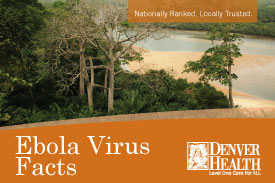Ebola virus disease (Ebola), first discovered in 1976, is a severe infectious disease that causes organ failure and death in humans. Outbreaks have occurred in parts of central and west Africa, near tropical rainforests. Download an Ebola information sheet.
 How is Ebola Spread?
How is Ebola Spread?
People can get Ebola virus in two ways: from an infected wild animal or from another person who has Ebola.
- Ebola does not spread through the air. It spreads through direct contact, with infected bodily fluids, including blood, urine, sweat and breast milk.
- In Africa, people have gotten Ebola after handling infected chimpanzees, gorillas, fruit bats and monkeys, among other animals.
Who is at risk for getting Ebola?
People at highest risk for getting Ebola include:
- People living in Central and West Africa
- Healthcare workers providing medical services to people with Ebola.
- Travelers visiting areas where an Ebola outbreak has recently occurred.
At this time, there is little risk for the general U.S. population.
What are the signs and symptoms of Ebola?
Early symptoms such as fever and muscle pain are non-specific. These are followed by more severe symptoms including:
- Vomiting
- Diarrhea
- Rash
- Impaired kidney and liver function
Ebola outbreaks have a fatality rate of up to 90 percent. Treatment is more effective if started early.
What should a person do if they think they have Ebola?
Severely ill patients require immediate, intensive care. People who may have been exposed to Ebola and do not feel well should immediately go to the hospital. They should tell the medical staff they think they have been exposed to Ebola.
How can you prevent Ebola?
- There is currently no vaccine to prevent Ebola.
- People should limit travel to areas where an Ebola outbreak has recently occurred or is occurring.
- If people must travel to an area where Ebola virus is present, take safety measures when handling wildlife.
- Protective equipment, including gloves and masks, should be worn around anyone who is ill with symptoms consistent with Ebola infection.


